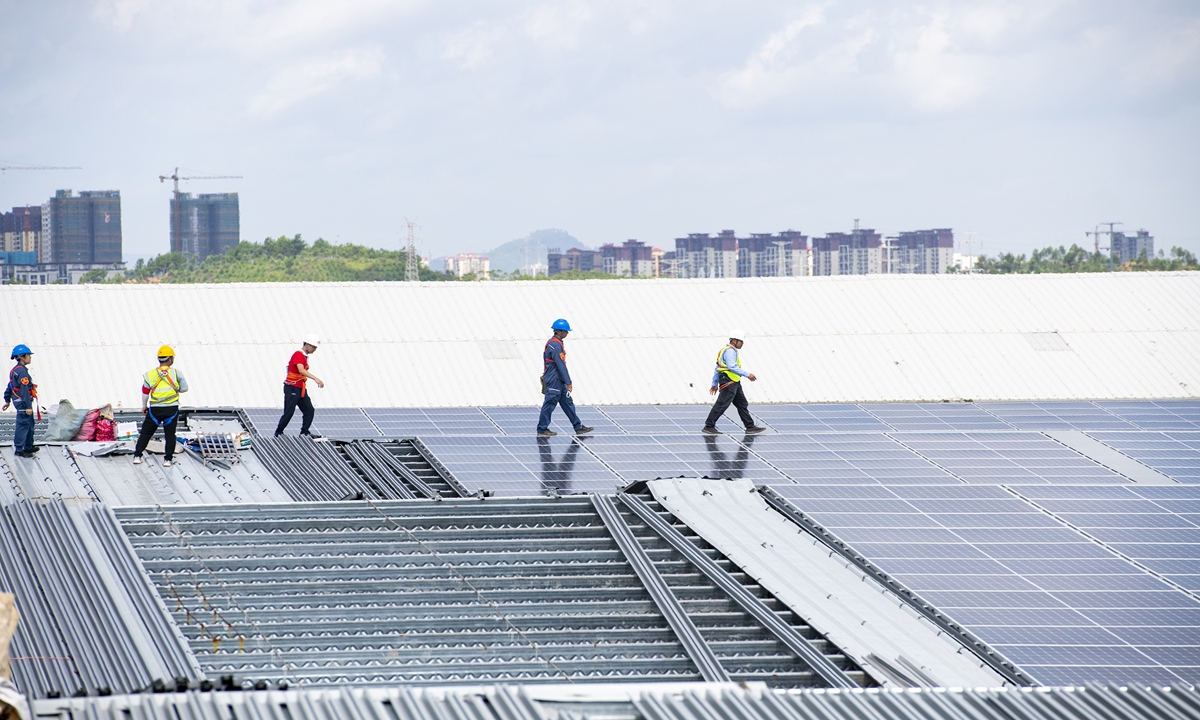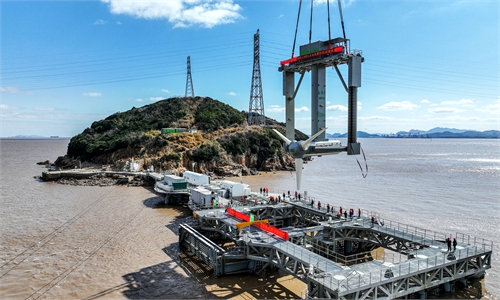China releases plan on carbon emission innovations, shows determination to abide by climate commitment despite US interruptions

Workers install solar power generation modules on a factory's roof in Teng County, South China's Guangxi Zhuang Autonomous Region, on June 23, 2022. Photo: VCG
China's Ministry of Science and Technology, along with other departments, on Thursday made public an implementation plan to support technological innovations to help the country achieve peak carbon emission and reach carbon neutrality.
Analysts said the plan shows China's determination to abide by its commitment on carbon reductions despite a suspension of China-US climate change talks due to US House Speak Nancy Pelosi's provocative visit to the island of Taiwan.
By implementing the plan, China will achieve major breakthroughs in key low-carbon core technologies in key sectors and areas by 2025, and support an 18 percent drop in carbon dioxide emissions per unit of GDP and a 13.5 percent drop in energy consumption per unit of GDP from 2020 levels, the plan says.
The Chinese government also set the goal of further research and breakthroughs in a number of carbon-neutral frontiers and disruptive technologies by 2030, and to strongly support the reduction of carbon dioxide emissions per unit of GDP by more than 65% compared to 2005.
According to a subsequent policy interpretation issued by China's Ministry of Science and Technology, the plan focuses on science and technology innovation, with an emphasis on strengthening the supply of efficient, low-cost low-carbon technologies, while also giving due consideration to policy innovations such as low-carbon technology standards to promote the industrialization of low-carbon technologies.
Yang Fuqiang, a senior advisor on climate change and energy transition at the Energy Research Institute at Peking University, told the Global Times that the focus of this guiding policy is to indicate the direction of China's next step in achieving its carbon reduction goals, namely innovation in all aspects.
"Previously, there were many who thought that carbon reduction was a burden, something that would be costly and would constrain economic development," Yang said. "This new policy specifies that carbon reduction should be achieved through institutional innovation, policy innovation and technological innovation. This will become a new growth driver."
China also plans to continue deepening international cooperation in low-carbon science and technology innovation from 2022 to 2030 and build an international network for cooperation in green technology innovation, according to the policy interpretation.
Previously, China announced a series of countermeasures, including the suspension of discussions with the US on climate change, after US House Speaker Nancy Pelosi visited the island of Taiwan despite strong opposition from China.
This does not mean that China will abandon its commitment to carbon reduction, Yang told the Global Times.
"Cooperation between China and the US on climate issues at the civilian level has never stopped, including businesses, universities, think tanks, private NGOs and others, despite that cooperation on climate issues at the government level between China and the US is stagnating at the moment," Yang said.
Instead, US officials have recently been pressuring China to resume climate talks, and have completely ignored the fact that the US is the one at fault for the suspension of the mechanism, observers noted.
Even if cooperation between the Chinese and US governments on climate issues cannot resume in the near future, China will continue to advance its own carbon-reduction efforts at home, Yang said, noting that judging by past experience, US' ability to meet its commitments is more of a concern.
US President Joe Biden on Tuesday signed into law the Inflation Reduction Act, including a roughly 400-million-dollar investment in fighting climate change.
"The amount of funding the US government needs to address climate issues is clearly not enough, compared to its previous commitments," Yang said.
The senior adviser, who has worked for both Chinese and US environmental groups, noted that previously, the US as a developed country had made promises in some climate policies to help developing countries with construction and technology transfers, but they have never been fully carried out.

